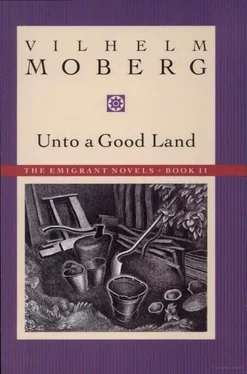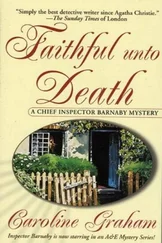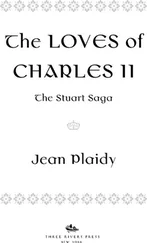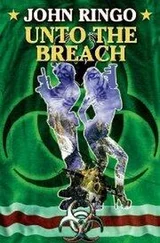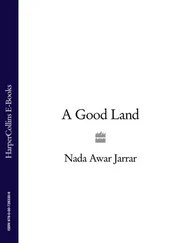“Now we’re near the place I’m looking for,” said the Finn. “This same notice was on the door last fall when I was here.”
Robert, who had begun to learn English from his book during the voyage, tried to read the notice on the door. He recognized some of the words but could not understand their meaning; he wanted to ask the Finn, but Arvid took the question from him: “What do the words say?”
The Finn explained: It had been predicted that the Day of Doom would take place in New York during October last year, and the owner of the shop had closed in advance to honor Christ on His return. The King of Kings had not appeared, but the shop still remained closed; perhaps the owner had starved to death by now.
There was another notice a little lower on the door, and the Finn bent down to read it: Muslin for Ascension Robes. Muslin to meet the King of Kings. 20 cents a yard.
The boys wanted to know what this notice said.
“Oh, just that the storekeeper sold wedding gowns for Christ’s brides,” said the Finn.
And now the Finn must attend to the captain’s errands. He told the boys to find their way back to the ship alone; it was not difficult, only turn right about and then to the left. And if they wanted to go to the end of the street, they could do so. Broadway was about three miles long and ran right through Manhattan. They would not lose their way if they stayed on Broadway.
The Finn nodded good-by and they saw him enter a saloon with the name Joe’s Tavern on the window; it was next door to the little shop which had been closed for the arrival of the King of Kings.
— 2—
Arvid and Robert continued alone up Broadway. It was only today that they had been released from their long imprisonment. A feeling of unaccustomed freedom filled them now that they were free to move unhindered on solid ground. Boldly they decided to walk to the street’s very end, however far it stretched. Then they would turn straight about and walk back to the harbor and their fellow passengers.
And so they continued along the most beautiful street in the world; they stopped and looked at the tall houses, they examined inscriptions over doors: Store, Steak House, Coffeehouse, Lodging House, Brown’s Store, Drugstore. They tried to interpret the inscriptions and guessed at their meaning. Could this be a tavern? Was that a hawker’s shop? Or an apothecary? The word store in particular impressed them, it appeared on one building after another. At last Arvid espied a small house, which he thought must be an outhouse, and he pointed for Robert to look, and laughed: “Look at that one! They call that a store too!”
“They must be bragging,” said Robert. But he did not mind this exaggeration; it was always true that the smaller you were the more you needed to seem bigger.
He tried to understand words and sentences he overheard, but everything was unintelligible, senseless jabber; not even one word, not a single syllable, was he able to recognize from his language book. He felt discouraged and disappointed. When he had stepped ashore he had thought he knew enough English to understand what he heard, even if he couldn’t answer properly; he began to think they had cheated him in Karlshamn by selling him an unreliable book.
The boys arrived at an open square where many booths had been erected, and they thought this must be a market day. Here they stood long and gazed; Robert had said they shouldn’t stand and stare because they might be laughed at, but this market fascinated them.
Wooden barrels stood in long rows, running over with potatoes, turnips, cabbages, carrots, peas, beets, parsnips, and many other roots which they saw for the first time; barrels in great numbers were filled with fruit — yellow, red, green, striped — apples, cherries, plums, and other fruits and berries which they never before had seen and the names of which they did not know. Between the barrels were long rows of baskets full of eggs and tubs full of butter, so fat that it seemed to perspire; on poles hung yellow, round, fat cheeses, big as grindstones; carcasses of animals, legs of pork, steaks, shortribs, and sides of bacon were stacked like firewood in high piles. Sizable, well-stuffed sausages hung in lines over tables on which stood vessels of ground meat and salted hams. There were booths with fowl: chickens, ducks, game birds; other fowl were stacked in hills of feathers, of all earthly bird colors, with a sprinkle of blood here and there on heads, necks, and wings. Four-footed beasts of the wild hung here in great numbers, hairy bodies of stags and does, hares and rabbits, known and unknown animals. In other stands were large tables with fish, long and short, broad and narrow, fat and spindly, black and white, red and blue; fish with striped bodies, misshapen fish, all head and protruding eyes, fish with ravenous jaws and sharp teeth like dogs’, fish with fins as sharp as spears, and fish with long tail fins by which they hung on hooks, swinging like pendulums as the shoppers brushed against them. On the ground stood wooden boxes in which crawled and crept shellfish, horrible-looking sea monsters, lizardlike creatures, frogs, crayfish, mussels, snails, animals in shells that opened up like caskets, and shellfish that crawled about and resembled who knew what; nothing they had ever heard of, seen, or known, now or ever in all their living days.
The barrels, baskets, tubs, tables, boxes, and buckets in this market place were filled to overflowing; the whole place seemed flooded with fruit and meat, pork and lamb, fins and feathers, shell and hides, flooded with food of endless variety. People shopping here tramped in food, hit their heads on food, were enveloped in food, tumbled about in food. Who would skin all these animals, pluck all these birds, scale all these fish? For strangers and new arrivals, there was a booth in the market offering samples of all the food products which the new land offered its inhabitants. Here they saw the Creator’s many gifts, fruits and berries, roots, herbs, and plants; they saw crawling, flying, swimming creatures, and meat from the cattle and beasts which God had created on the Sixth Day, before He created Man.
The two youths beheld the earth’s abundance in a market next to the most beautiful street in the world. This much they understood: there was food in sufficiency in North America; it would be enough for them too, and for the seventy immigrants who had arrived with them today; they knew, from what their own eyes told them, that they had entered a new world.
— 3—
The day was nearing its warmest hour, the heat lay like a heavy weight over the city, making breathing difficult for the crowds on the street. People sought the shade and sat with their backs against house walls, drowsy, resting with their eyes closed; little babies slept at their mothers’ breasts, women sat leaning their heads against men’s knees. A half-naked Negro boy with a shoebrush in one hand and a jar of shoe blacking in the other strolled about, calling: “Black your boots! Black your boots!”
Robert and Arvid dragged their steps, burdened by their heavy wadmal clothes. Their hair, grown long during the voyage, felt sticky and uncomfortable. They pushed their way among brown pigs poking in the gutter, they squeezed themselves in between the carts of fruit sellers; now and again they were hailed by peddlers offering them wares; once a man stopped and spoke directly to them. Robert had learned what to say when accosted by an American: he had the sentence ready on his tongue, he was glad to use it now for the first time: “I am a stranger here.”
But the man only stared at him. Robert repeated the words, carefully, clearly, he pronounced each syllable as directed in the language book. But the man only shook his head.
Читать дальше
